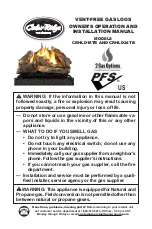
www.usaprocom.com
15
200028-01A
INSTALLATION
CONNECTING TO GAS SUPPLY
CAUTION: For natural gas,
check your gas line pressure
before connecting heater to gas
line. Gas line pressure must be
no greater than 10.5" WC. If gas
line pressure is higher, heater
regulator damage could occur.
CAUTION: Avoid damage to
regulator. Hold gas regulator
with wrench when connecting
into gas piping and/or fittings.
CAUTION: Use pipe joint
sealant that is resistant to gas
(Propane/LP or Natural Gas).
Before installing heater, make sure you have
the items listed below:
• external regulator for propane/LP unit only
(supplied by installer)
• piping (check local codes)
• sealant (resistant to natural gas and pro-
pane/LP gas)
• equipment shutoff valve*
• test gauge connection*
• sediment trap
• tee joint
• pipe wrench
• flexible gas hose (check local codes)
* A CSA design-certified equipment shutoff
valve with 1/8" NPT tap is an acceptable al-
ternative to test gauge connection. Purchase
the optional CSA design certified equipment
shutoff valve from your dealer.
WARNING: A qualified ser-
vice technician must connect
heater to gas supply. Follow all
local codes.
WARNING: This appliance
requires a 1/2" NPT (National
Pipe Thread) inlet connection to
the pressure regulator.
WARNING: For natural gas,
Never connect heater to private
(non-utility) gas wells. This gas
is commonly known as wellhead
gas.
CAUTION: For propane/LP
gas, never connect heater direct-
ly to the gas supply. This heater
requires an external regulator
(not supplied). Install the external
regulator between the heater and
propane/LP supply. Gas supplier
provides external regulator for
natural gas. The installer pro-
vides the external regulator for
propane/LP gas.
WARNING: Do not over-
tighten gas connections.
CAUTION: Use only new,
black iron or steel pipe. Inter-
nally tinned copper tubing may
be used in certain areas. Check
your local codes. Use pipe of
1/2" diameter or greater to allow
proper gas volume to heater. If
pipe is too small, undue loss of
pressure will occur.
















































